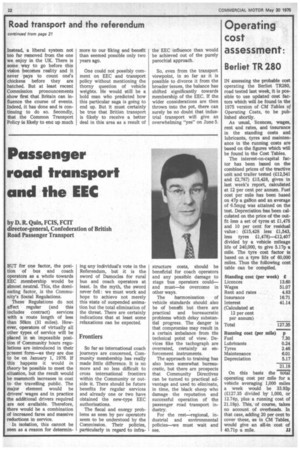Passenger road transport and the EEC
Page 32

If you've noticed an error in this article please click here to report it so we can fix it.
by D. R. Quin, FCIS, FCIT director-general, Confederation of British Road Passenger Transport
BUT for one factor, the position of bus and coach operators as a whole towards EEC membership would 'be almost neutral. This, the dominating factor, is the Community's Social Regulations.
These Regulations do not affect regular (and this includes contract) services with a route length of less than 50km (31 miles). However, operators of virtually all other types of service will be placed in 'an impossible position if Community hours regulations are introduced in their present .form—es they are due to be on January 1, 1976. If this happens it would in theory he possible to meet the situation, but the result would be mammoth increases in cost to the travelling public. The major element would be drivers' wages and in practice the additional drivers required are not available. Therefore, there would be a combination of increased fares and massive reductions in service.
In isolation, this cannot be seen as a reason for determin ing any individual's vote in the Referendum, but it is the sword of Damocles for rural bus and coach operators at least. In the myth, the sword never fell: we must work and hope to achieve not merely this state of suspended animation but the total elimination of the threat. There are certainly indications that at least some relaxations can be expected.
Frontiers
So far as international coach journeys are concerned, Community membership has really made little difference. It is no more and no less difficult to cross international frontiers within the Community or outside it. There should be future benefits for regular services and already one or two have obtained the new-type EEC authorisations.
The fiscal and energy problems as seen by psv operators seem to be understood by the Commission. Their policies, particularly in regard to infra structure costs, should be beneficial for coach operators and any possible damage to stage bus operators could— and must—be overcome in other ways.
The harmonisation of vehicle standards should also be of benefit but there are practical and bureaucratic problems which delay substantial progress. The danger is that compromise may result in a certain imbalance from the technical point of view. Devices like the tachograph are overrated, certainly as enforcement instruments.
The approach to training has also been somewhat bureaucratic, but there are prospects that Community Directives can be turned to practical advantage and used to eliminate, in time, the black sheep who damage the reputation and successful operation of the passenger road transport industry.
For the rest—regional, industrial and environmental policies—we must wait and see.




























































































